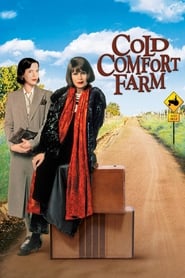For those who haven't yet had the pleasure of reading the original book, Cold Comfort Farm will feel like they are missing an inside joke. Whilst those who have read Stella Gibbons' comic novel will realise that there is perhaps not much of a joke to get in this adaptation, and will ultimately be disappointed by this thin tribute to the gloriously brazen Flora Poste.
Yet all you really need to know is the original book was that it was satire of both the overwritten novels of the 1930s and a cod-Gothic send-up of common literary tropes, especially those found in country melodramas and especially those written 'for women'. Crucially, however, the book didn't require you to be overly familiar with specific literary references. Yes, I'm sure reading a few D. H. Lawrence novels would make the satire bite a bit deeper and you probably need to have a passing familiarity with what a 'Baedeker' is to understand those metatextual asterisks placed beside specific paragraphs. But you clearly don't need to have read anything at all to know that, for example, it has been a cliché since Dickens for an orphan to be dispatched to their exceeding poor and faraway relatives who work them to the bone in some ramshackle house. And hence the inherent comedic inversion in Flora sending herself to the relatives of her choosing, Flora fixing up their existence instead of them being the 'making' of her, Flora not falling for the Poldarkian (and semi-rapey) sexual charms of Seth, and, in more general terms, Flora being something of a force of nature rather than being buffeted around by fate. (Or men.)
When translated to film, however, much of this paratextual humour is lost. There is only one moment that I can point to where the movie is directly parodying other movies, and the admittedly funny Gone With The Wind (1939) needledrop feels tonally out of place by that point in the runtime. (The American film producer could perhaps have been modified to make more gags at cinema's expense?) Without this parodic aspect, the film is merely a whistle-stop tour of the book's main plot points, evoking the novel's charm at some distant remove as if the film had been lightly perfumed with the scent of the original novel. Sometimes these stops aren't even given the privilege of a whistle, mind you, for the film often feels like it's rushing from scene to scene, despite taking far too long to admire Well Known Character Actor #4 grossly overacting their country persona, or when it luxuriates over its costume budget in the lengthy party scenes. (Not unrelatedly, there seem to be two cuts of this film: I watched the 95-minute one on BBC iPlayer, but there is also a 105-minute version on the internet also.) Perhaps more voiceover narration from Flora's perspective would have helped underscore that she is the real engine of the plot and that she is constantly muting her intelligence and quick insight under the surface.
This is peak 1990s British TV, coming out the same year as the famous BBC adaptation of Pride and Prejudice. Immediately there's that particular 1990s colour palette, of course, the aforesaid over-exaggerated comic performances straight out of your local arts theatre playhouse... and let's not forget Joanna Lumley stealing the show, the obligatory Stephen Fry appearance (doing the same 'Stephen Fry' schtick that now feels very tired indeed), and, seemingly like all British shows from the 1990s, a gently chipper soundtrack dominated by clarinets and saxophones to evoke "the 1930s".
Nevertheless, it all goes down like a cup of tea and biscuit, which no doubt it was designed to do. Mad to consider that this director also made Midnight Cowboy (1969).
Synopsis: In this adaptation of the satirical British novel, Flora Poste, a plucky London society girl orphaned at age 19, finds a new home with some rough relatives, the Starkadders of Cold Comfort Farm. With a take-charge attitude and some encouragement from her mischievous friend, Mary, Flora changes the Starkadders' lives forever when she settles into their rustic estate, bringing the backward clan up to date and finding inspiration for her novel in the process.

